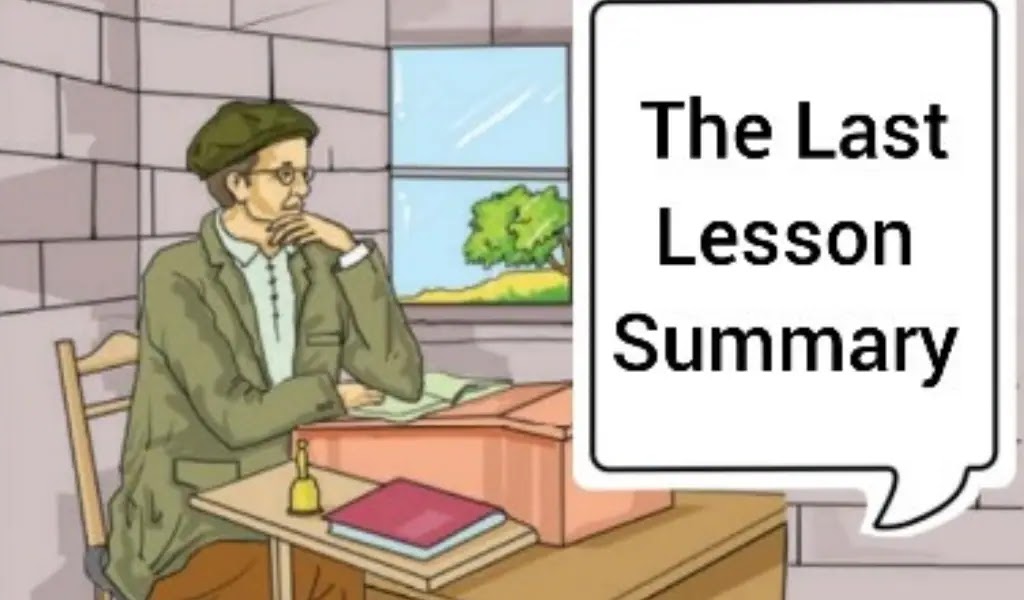Introduction:
France had been defeated by Prussia and the story explores the effects of this on the life at school in French districts under Prussia. Alphonse Daudet‘s pathos-stricken story, “The Last Lesson” mournfully commemorates Franz’s final day of French instruction, before the school’s switched over to the language of the German occupiers.
The Last Lesson Summary:
Franz was reluctant to go to school and had dawdled on the way. As a result, he was late to school and was in great dread of M. Hamel because he had not prepared his lesson on Participle. He did not even stop to read the bulletin board at the town hall, where one normally read all the bad news and where he saw many people had assembled.
As he reached school, he found the commotion at school was missing and there was an unusual silence among the classmates. Franz first realised that something was different when he was greeted with silence. Not only that, M. Hamel was his unusual self. He was kind to Franz though he was late. Also, Hamel was dressed in frills, as he would on special occasions. At the back of the class were some villagers, all with a sad look.
M. Hamel announced the defeat of the French at the hands of Prussia and the orders that school would teach only German. In view of that, he would be delivering his last French lesson.
The words of M. Hamel were like a sudden blow and a sense of loss overcame Franz. The same fear he saw on the faces of the villagers who had assembled there in honour of the master’s faithful service of forty years and to express respect for their lost country.
M. Hamel, not upset with Franz’s inadequacy to recite, reminded the class how we put off things till tomorrow only to realise tomorrow has been overcome and, also how falsely we take pride in being French when we don’t even know the language. With this sense of loss sank in the value of the last lesson. There was an unusual seriousness in the class as if M. Hamel wanted to give away all he could and the class wanted to absorb it all. The grammar, the writing and the history classes were taken with undue seriousness.
During his last hour with students, the French teacher praised his language as ‘the strongest, clearest, most beautiful language in the world’, driving home that his pupils keep it as their ‘heritage, never allowing it to be forgotten.’ He reminded that those who hold on to their language can never be enslaved and have the key to prison. M. Hamel’s voice trembled with emotion as he spoke. The sound of the Prussian trumpets choked him. Banished from their midst, finally he felt a message – “Vice la France! ” – behind, on the blackboard and in the hearts of his young listeners.
The Last Lesson Questions Answers:
1. Describe the atmosphere that prevailed in the class on the day of the last lesson.
Ans: The order from Germany had suddenly awakened the spirit of the patriotism and a love for their language in every heart. The villagers had assembled in the school to attend M. Hamel’s last lesson. Even the back benches which were always vacant were occupied. The students and those who had come to attend the class sat with seriousness. They seemed keen to grasp everything. Even the writing and the history classes were noiseless and only the scratching of the pens on paper could be heard.
Hamel, too, was unusually calm and did not scold. He explained everything with patience and even to Franz the lessons seemed so easy. An atmosphere of regret and deep loss hung in the class.
2. What does “The Last Lesson” symbolize?
Ans: Prussia had overcome France and, in the wake of it, an order had been issued from Germany that only German would be taught in schools in Alsace and Lorraine. Such dominance and supression are the strategies of the victorious country to kill the soul and the spirit of the nation they now control.
A nation has great pride in its language and it is one’s key to any prison. There was, at that point, fear in every heart in Alsace that the nation might die. The whole village was upset and in grief at the loss of freedom to use their language even in their own land. This is one tragedy of war highlighted in “The Last Lesson” that the conquered people have their language, which is their identity, taken away from them.
3. Why was the lesson called the last lesson?
Ans: The French had been defeated by the Prussians and an order had come from Berlin that only German would be taught in schools. The Last Lesson refers to last lesson delivered by M. Hamel in the village school before he was going to pack and leave. The whole village had assembled to attend it in honour of the village master who had served them for forty years.
The master had dressed up specially for the occasion though the air was heavy with grief and regret. The master taught as if he wanted to give all he had in that one class which is his last lesson and villagers sat with all seriousness to learn as much as in the last lesson. In his lesson, he made them realise the importance of one’s language and the consequences of putting off learning till tomorrow, which may not be in their control.
You May Like To Read:
- The Thief’s Story Summary Questions Answers
- The Story of My Life Summary Questions Answers
- The Gift Of The Magi Summary Questions Answers
